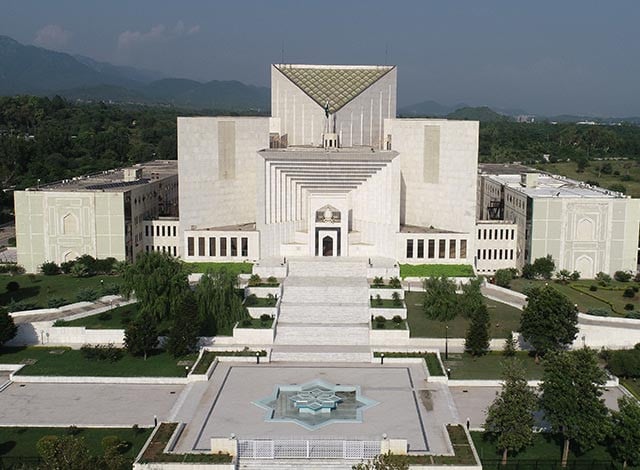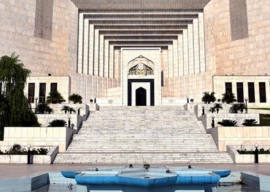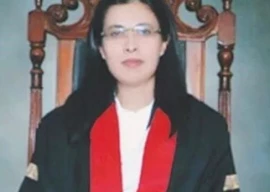
Following the issuance of a contempt notice to the additional registrar for failing to fix cases related to the 26th Amendment before a regular bench, the Supreme Court has now listed all petitions challenging the constitutional tweak before an eight-member constitutional bench.
The hearing is scheduled for January 27 (Monday).
The move comes after a three-judge regular bench led by Justice Syed Mansoor Ali Shah expressed serious concern over the delay in hearing the case where it was questioned whether the jurisdiction of the SC's regular benches could be curtailed through the 26th Amendment.
The bench was surprised that the SC office did not fix the matter following the committee's decision, which was not even in written form.
During Monday's hearing, Justice Shah's bench criticised the Supreme Court office for not scheduling the case after the committee's decision, which had yet to be documented in writing. The court issued a show-cause notice to the additional registrar and summoned him for an explanation on Tuesday (today).
Earlier, Justice Mansoor Ali Shah and Justice Munib Akhtar had urged Chief Justice of Pakistan (CJP) Yahya Khan Afridi to immediately fix hearings for the pleas challenging the 26th Constitutional Amendment.
The dispute began on October 31, 2024, when Justices Shah and Akhtar formally addressed a letter to CJ Afridi, urging him to meet under the Supreme Court Practice and Procedure Act, 2023.
The two senior justices requested the meeting specifically to address the petitions contesting the 26th Amendment, which involves changes to judicial authority and tenure. However, with no response from the CJ, Justices Shah and Akhtar held an independent meeting in Justice Akhtar's chambers to determine the next steps.
Following this private session, the two justices decided by a majority vote to bring the amendment petitions before a full court on November 4. Despite their decision, no cause list was issued.
On the other hand, supporters of CJP Afridi claimed that he had consulted all judges and that the majority were not in favour of forming a full court.
Later, CJP Afridi conveyed that a constitutional bench would decide about the constitution of a full court.
Meanwhile, the development has sparked debate over whether the constitutional bench should include all SC judges as petitioners are expected to request the constitution of a full court to address the matter.
All attention is now focused on the eight-member constitutional bench as it deliberates on whether to constitute a full court.
On the other hand, legal experts also suggest that the regular bench led by Justice Shah should pass judicial orders regarding the fixation of a full court, as the constitutional bench itself is a product of the 26th Amendment.
The All-Pakistan Lawyers Action Committee (APLAC) has demanded that the regular bench hear the case. The group criticised the removal of the case from Justice Shah's bench, describing it as a violation of judicial independence and the principle of separation of powers enshrined in the Constitution.
"We, the undersigned elected and former office bearers of the Pakistan Bar Council, Provincial Bar Councils, and Bar Associations of the High Courts and District Courts, who are members or sympathizers of the All-Pakistan Lawyers Action Committee (APLAC), issue this letter in unambiguous solidarity with the press release of the Balochistan Bar Council, and Justice Mansoor Ali Shah in the matter of the unjust removal of a case assigned to his bench."
"The Constitution of Pakistan, 1973, is the supreme law of the land. Article 4 enshrines the right of every individual to be dealt with in accordance with the law, while Articles 175 and 184(3) establish the separation of powers and the independence of the judiciary as inviolable cornerstones of our democratic framework. The judiciary is bound to act in accordance with these principles, ensuring impartiality and safeguarding against undue influence or interference," the committee's statement read.
"As members of the legal fraternity, we are alarmed by the recent deviation from the precedent laid down in Wukala Mahaz Barai Tahafuz-e-Dastoor v. Federation of Pakistan (PLD 2018 SC 276), authored by Justice Qazi Faez Isa and Justice Syed Mansoor Ali Shah. This judgment unequivocally stated that once a case is assigned to a bench and hearings commence, that same bench must conclude the matter. This principle, rooted in judicial discipline and constitutional propriety, protects against arbitrary interference in the judicial process."
The committee also states that the removal of a case from Justice Mansoor Ali Shah's bench not only undermines the sanctity of the SC but also violates the principle of judicial independence enshrined in Article 209 of the Constitution, which binds judges, including the CJP, to act without fear or favour, in accordance with their oath under the third schedule.
Any action that deviates from this principle constitutes a betrayal of the Constitution and the trust of the people of Pakistan.
Internationally, the Basic Principles on the Independence of the Judiciary (adopted by the United Nations General Assembly in 1985) and landmark cases such as S.A. De Smith v. R (UK, 1968) emphasise that judicial independence is not merely a privilege of judges but a fundamental right of citizens.
Any interference with a judge's assigned role in adjudicating a case violates this foundational right and compromises public confidence in the judiciary.
"We categorically state that any attempt to circumvent these principles, whether by misinterpreting the Constitution or manipulating judicial processes, will not be tolerated. The judiciary does not serve the whims of a select few but exists to uphold the equitable and just foundations of this nation," the statement read.
As representatives of the legal fraternity, the APLAC asserted, that it reminds the judiciary, particularly the CJP, that their constitutional mandate is to protect and preserve the Constitution and the law.
"They are duty-bound to act as guardians of justice, not facilitators of vested interests."
"The recent actions that undermine the independence of the judiciary threaten to transform the Supreme Court into a subordinate institution, eroding its credibility and integrity. This must be resisted at all costs," says the statement issued by the lawyers body which opposes the 26th Amendment.
However, Hafiz Ehsaan Ahmad Advocate asserts that there is now no legal jurisdiction available to any other bench of the Supreme Court except the constitutional bench constituted by the judicial commission to hear and fix such cases.
These cases, barred under Clauses 3, 4, and 5 of Article 191A of the Constitution, require interpretation of Article 191A and customary law.
He said that the transfer to the constitutional bench, as told in court, renders actions such as issuing contempt notices to the Additional Registrar by a regular bench contrary to the clear constitutional provisions and the Supreme Court Practice and Procedure Act, 2023, and therefore seem without jurisdiction.

1737426578-0/Untitled-design-(65)1737426578-0-405x300.webp)


1737416356-0/Trump-(9)1737416356-0-165x106.webp)



















COMMENTS
Comments are moderated and generally will be posted if they are on-topic and not abusive.
For more information, please see our Comments FAQ